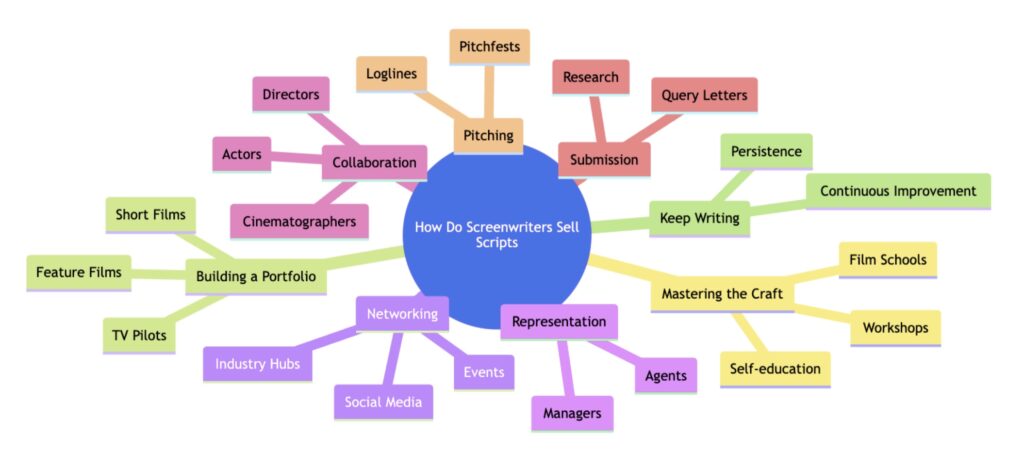Breaking into the film industry as a screenwriter is no small feat. It involves mastering the art of storytelling, building a diverse portfolio, and navigating the complex landscape of agents, producers, and film companies. This article provides a comprehensive guide to help aspiring screenwriters sell scripts, from the initial stages of honing their craft to the final steps of sealing a deal.
Key Takeaways
- Mastering the craft of screenwriting is the foundation for selling a script.
- A diverse portfolio can open doors to representation and opportunities.
- Networking is crucial for building relationships in the industry.
- Agents can be invaluable for distributing your script to the proper channels.
- Collaboration with other filmmakers can provide practical insights into the industry.

The Importance of Mastering the Craft
The first step in selling a screenplay is to become proficient in the art of storytelling. This involves understanding the industry’s standard screenwriting practices. This can be achieved through various avenues:
- Film Schools: These institutions offer structured courses that cover the basics and advanced techniques of screenwriting.
- Workshops: Short-term workshops can provide focused training on specific aspects of screenwriting.
- Self-Education: Watching movies and reading screenplays can also be an effective way to learn the craft.
Lifelong Learning
It’s important to note that learning is a continuous process. Even industry professionals regularly update their skills to stay relevant.
Building a Strong Portfolio
A strong portfolio is not just a recommendation but a necessity for aspiring screenwriters. It serves as your professional calling card, offering tangible proof of your storytelling abilities and technical skills.
A well-crafted portfolio can make the difference between getting your foot in the door or having it shut in your face. Here’s how to make your portfolio stand out:
1. Feature Films
Full-length scripts are the cornerstone of any screenwriter’s portfolio.
They demonstrate your ability to sustain a narrative over a longer format, typically 90 to 120 minutes.
Feature films are also the most common type of script that agents and producers want to buy. Therefore, having at least one polished full-length script can significantly increase your marketability.
2. Short Films
Short films serve multiple purposes in a portfolio.
Firstly, they are excellent for entering film festivals, which can be a career-launching pad.
Secondly, short films allow you to experiment with different genres and styles, showcasing versatility.
Lastly, they are quicker to read, making them more accessible for agents or producers who may be short on time but still want to understand your writing style.
3. TV Pilots
Television is a medium that allows for extended character development and intricate story arcs.
A well-written TV pilot not only shows that you can set up a compelling world and introduce engaging characters but also that you can create the kind of hooks and cliffhangers that keep audiences coming back for more.
Having a TV pilot in your portfolio indicates to potential buyers that you understand the unique demands of writing for episodic content.
Table 1: Types of Scripts to Include in Your Portfolio

Networking: Your Gateway to the Industry
Networking plays a vital role in a screenwriter’s career. It’s not just about who you know – but also about who knows you. Here are some ways to build your network:
- Networking Events: These are organized by industry bodies and offer a platform to meet professionals.
- Social Media: Platforms like LinkedIn and Twitter can be helpful for connecting with industry professionals.
- Industry Hubs: Consider relocating to a place like Los Angeles, where you’ll be more likely to meet people in the film industry.
Tips for Effective Networking
- Always be respectful and professional.
- Follow up with new contacts.
- Keep an updated portfolio to share when opportunities arise.
Representation: Finding the Right Agent
Choosing the right agent is a pivotal step in a screenwriter’s journey to sell a script.
Agents not only have the connections to get your script in front of the right people but also possess the expertise to negotiate the best deals for you. Here’s how they can assist:
- Distributing Scripts
Thanks to their extensive network within the industry, agents serve as the crucial bridge between you and potential buyers.
They have contacts in various production companies, studios, and even independent filmmakers looking for scripts like yours.
Agents can strategically send your script to places where it is most likely to be read and bought. This targeted distribution can save you time and increase your chances of making a sale.
- Negotiating Deals
Once your script has caught someone’s eye, the next step is entering into negotiations – where an agent’s expertise becomes invaluable.
They are well-versed in the intricacies of contract law as it applies to the entertainment industry. An agent advocates for your interests, from ensuring you retain certain rights to your work to negotiating the best possible financial terms.
Their skilled negotiation can mean the difference between a standard deal and one that is highly favorable to you.
How to Choose an Agent
Selecting an agent involves careful consideration. Research their track record, ask for references, and ensure they specialize in your genre.
A good agent will be proactive, transparent, and aligned with your career goals.
Flowchart: Steps to Choose an Agent

Collaborate to Elevate
Collaboration is more than just a buzzword in the film industry; it’s necessary.
Working with other professionals can provide valuable insights and increase opportunities. Here are some people you should consider collaborating with:
- Directors: They can provide a different perspective on how your script will appear on screen.
- Actors: Sometimes, a character’s voice becomes more apparent when you hear someone else bring it to life.
- Cinematographers: These are the people who will translate your written words into visual art.
Ways to Find and Choose Collaborators
- Attend industry events.
- Join online forums and groups.
- Get recommendations from people in your network.
Submission Guidelines and Query Letters
Once you have a polished script and a network of contacts, the next step is to submit your work to production companies. This involves a bit of groundwork:
- Research: Look for companies that specialize in the kind of script you’ve written.
- Query Letters: These are formal letters sent to production companies to inquire about their interest in your script.
Table 2: Do’s and Don’ts of Query Letters

The Art of the Pitch
Pitching is an art form that every screenwriter must master. Whether you’re talking to studio executives, producers, or directors, your pitch must be compelling and concise.
Here’s how to prepare:
- Loglines: These are one-sentence summaries of your script that capture its essence. A good logline can pique interest and open doors.
- Pitchfests: These are events where screenwriters can pitch their ideas to multiple industry professionals. (1)
Common Mistakes to Avoid During a Pitch
- Over-explaining the plot
- Ignoring the emotional core of the story
- Failing to engage the listener
Keep Writing: The Journey Is Long
The process of selling a screenplay is often long and arduous. While you’re waiting for that big break, it’s crucial to keep writing. Here are some reasons why:
- Continuous Improvement: The more you write, the better you get.
- New Opportunities: Each new script is a new opportunity for sale or representation.
- Skill Diversification: Writing different types of scripts can make you a more versatile screenwriter.
Tips for Staying Motivated
Staying motivated can be challenging in the long and often uncertain journey of selling a screenplay. Here are some tips to keep your spirits high and your focus sharp:
- Set Achievable Goals: Having specific, attainable objectives can give you something concrete to strive for – making the writing process feel less daunting.
- Join a Writing Group for Accountability: A community of like-minded individuals can provide both emotional support and constructive criticism.
- Celebrate Small Wins Along the Way: Acknowledging even minor accomplishments can boost your morale and motivate you for the long haul.
- Create a Writing Schedule: Consistency is key in screenwriting. Setting aside dedicated time for writing can make it a habit rather than a chore.
- Seek Inspiration: Whether it’s through reading, watching films, or engaging in other creative activities, stepping away from your script can offer fresh perspectives and renewed enthusiasm.
Final Thoughts
Selling a screenplay is a multifaceted endeavor that requires a blend of skill, strategy, and a bit of luck.
From mastering the craft to building a portfolio, networking, finding representation, collaborating, submitting your work, pitching, and continuous writing, each step is integral to the process. With the right approach and persistence, your script could be the next blockbuster or award-winning indie film.

